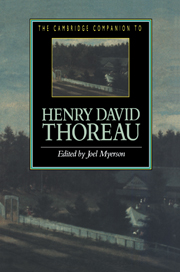Book contents
- Frontmatter
- 1 Thoreau’s reputation
- 2 Thoreau and Concord
- 3 Thoreau and Emerson
- 4 A Week on the Concord and Merrimack Rivers
- 5 Thoreau as poet
- 6 Thoreau and his audience
- 7 Walden
- 8 Thoreau in his Journal
- 9 The Maine Woods
- 10 A wild, rank place
- 11 Thoreau’s later natural history writings
- 12 Thoreau and the natural environment
- 13 Thoreau and reform
- Further reading
- Index
- Series List
8 - Thoreau in his Journal
Published online by Cambridge University Press: 28 May 2006
- Frontmatter
- 1 Thoreau’s reputation
- 2 Thoreau and Concord
- 3 Thoreau and Emerson
- 4 A Week on the Concord and Merrimack Rivers
- 5 Thoreau as poet
- 6 Thoreau and his audience
- 7 Walden
- 8 Thoreau in his Journal
- 9 The Maine Woods
- 10 A wild, rank place
- 11 Thoreau’s later natural history writings
- 12 Thoreau and the natural environment
- 13 Thoreau and reform
- Further reading
- Index
- Series List
Summary
When an anonymous interlocutor asked Thoreau, “Do you keep a journal? ” one of Thoreau’s responses was to begin one. This Journal turned out to be his largest work by far and, in his estimation, possibly his most important project as a writer. According to Thoreau, the inquiry about keeping a journal was preceded by another question: “What are you doing now? ” (PJ 1:5). There was something familiar and quite unfamiliar in starting a journal. Journal as private genre, as popular, published genre, as a miscellany in which various versions of this popular form appeared in the company of many other kinds of writings, and as a feature of daily and weekly newspapers with their miscellaneous and detailed reports were all familiar to him. Yet how should he initially proceed after taking note of the question of whether he kept a journal? What was he instating with his first entry?
The twin questions are also Thoreau’s questions, and they are ours as well: why should he as an aspiring writer keep a journal, what are the doings that warrant reporting, what is his relation to them, and what is he doing in reporting them? Others, the questioner implies, are keeping journals. Many others, we might add. Lawrence Buell reminds us that when Harvard professor of rhetoric Edward Tyre1l Channing assigned an essay on "The Advantages of Keeping a Journal" Thoreau "dutifully.. . noted three."[ Despite Thoreau’s familiarity with the term "journal," he wondered what he was doing in commencing his project.
- Type
- Chapter
- Information
- The Cambridge Companion to Henry David Thoreau , pp. 107 - 123Publisher: Cambridge University PressPrint publication year: 1995
- 2
- Cited by

